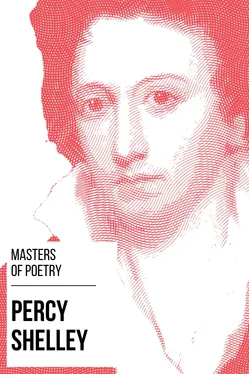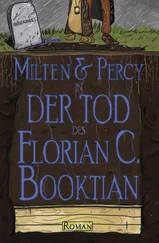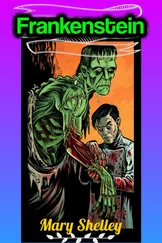"At the upper end, supported on an elevated platform, stands the temple of Jupiter. Under the colonnade of its portico we sate, and pulled out our oranges, and figs, and bread, and medlars,—sorry fare, you will say,—and rested to eat. Here was a magnificent spectacle. Above and between the multitudinous shafts of the sun-shining columns was seen the sea, reflecting the purple noon of heaven above it, and supporting, as it were, on its line the dark, lofty mountains of Sorrento, of a blue inexpressibly deep, and tinged toward their summits with streaks of new-fallen snow. Between was one small green island. To the right was Capreæ, Inarime, Prochyta, and Misenum. Behind was the single summit of Vesuvius, rolling forth volumes of thick white smoke, whose foam-like column was sometimes darted into the clear dark sky, and fell in little streaks along the wind. Between Vesuvius and the nearer mountains, as through a chasm, was seen the main line of the loftiest Apennines to the east. The day was radiant and warm. Every now and then we heard subterranean thunder of Vesuvius; its distant, deep peals seemed to shake the very air and light of day, which interpenetrated our frames with the sullen and tremendous sound."
Thus he wrote when merely passive to nature's influences; but when he begins to think he irradiates the scene; he lifts it with his aspiration and softens it with his regret; he brings it near by reminiscences of the English fields and cliffs and streams; he informs it with the large interests of the intellectual life; and not infrequently he concludes with a passage which, in the arrangement of its images, the sequence of its thought and feeling, the unity of its effect, in all except metrical structure, is a poem. Many paragraphs might be cited which show the character of his genius as directly as do his verses, and which justify the claim advanced for them as having the permanent interest of ideal beauty.
The principal charm of these letters, however, as Dr. Garnett says, is not artistic, but moral. It is not meant to refer by this term to the practical morality of Shelley's deeds, or to his conscientiousness, humanity, self-sacrifice, or other such qualities as they are here displayed; of these there is no longer need to speak. Nor is it meant simply to express the gratification one feels at finding that Shelley, unlike many men of letters who disappoint us by being only common mortals in private life, never falls below our conception of him, indicative as it is of his purity that his "unpremeditated song" does not fail to reach the height of his great argument. What impresses one most is rather the character of the life itself, of the mind to which "trust in all things high came natural," that moved with equal ease among the things of beauty, on the heights of thought, or amid the common and trivial cares of household life and in the offices of friendship, and knew no difference in the level of his life, so single was his nature and so completely expressed in all he did. In the most ideal passages, in those most impersonal, one does not lose the sense of friendliness in them, of the sweet human relationship which underlies the telling of what he has to say, and keeps the letters in their appropriate sphere. They are not rhapsodies, or soliloquies, or disquisitions; in other words, the visitations of the spirit that came to Shelley, and left record of themselves in this beauty and eloquence and imaginative passion, did not isolate him even momentarily, and could not sever him from his friends. Who these were, we know well enough: Miss Hitchener, the blue-stocking; Hogg, the betrayer; the Williamses and Gisbornes, who seem to have belonged to the class of people known as satisfying; Peacock, who, with all his nympholepsy, was a born beef-eater; Smith, the obliging; Hunt, the "wren," and Byron, the "eagle," in Shelley's nomenclature,—the too fortunate people who knew Shelley and whom he loved. They formed the environment, which needs to be kept in mind by any who would estimate Shelley's moral power; amid them he lived his high life and made it theirs, in the case of the most, during their communion with him. In a vague analogical way he sometimes brings to mind the Greek gods, who, with all their divine attributes of beauty, power, dignity, were singular among deities for their companionableness; Shelley had that divine quality of being familiar and retaining his original brightness. Toward Byron alone does he show any repulsion; he recognized Byron's admirable qualities, but he was alienated by the latter's selfishness, worldliness, and earthliness, even while he kept terms of amity. Shelley's sentence on Byron is most serious evidence against him, and it is now supported by much that Shelley could not have known; but it need not be discussed here.
It is especially fortunate that the letters exhibit him after his boyhood, with its false starts, its follies and prejudices, its narrowness and confusion, was passed; of that time we get only a noble echo in his sad remembrance, amid his seeming failure, of the lofty purpose with which he had entered life, while we see the depth unconfused by the tumult of his soul. In these last years, it is true, the thwarting of his practical instinct was ending in hopelessness; but if the earthly paradise that was the faith of his youth was now fading away, he was lifting his eyes to the city in the heavens, and had acknowledged the vanity of seeking the ideal he knew, except in the eternal; he had worked out his salvation. Perhaps after all we do wrong to lament his death; with that tragedy, in which every thought of Shelley involuntarily concludes, his work as a quickener of the spirit was accomplished. More finished works of art he might have given to us; he could not have left a nobler or more enkindling memory. These letters help in the still necessary labor of clearing away the misconceptions concerning him. In them one sees him only in the quiet of his soul, and will come to a better knowledge and perhaps a higher truth concerning him than is possible by reading his changeful poems alone.
by John Addington Symonds 2
BIRTH AND CHILDHOOD
It is worse than useless to deplore the irremediable; yet no man, probably, has failed to mourn the fate of mighty poets, whose dawning gave the promise of a glorious day, but who passed from earth while yet the light that shone in them was crescent. That the world should know Marlowe and Giorgione, Raphael and Mozart, only by the products of their early manhood, is indeed a cause for lamentation, when we remember what the long lives of a Bach and Titian, a Michelangelo and Goethe, held in reserve for their maturity and age. It is of no use to persuade ourselves, as some have done, that we possess the best work of men untimely slain. Had Sophocles been cut off in his prime, before the composition of "Oedipus"; had Handel never merged the fame of his forgotten operas in the immortal music of his oratorios; had Milton been known only by the poems of his youth, we might with equal plausibility have laid that flattering unction to our heart. And yet how shallow would have been our optimism, how fallacious our attempt at consolation. There is no denying the fact that when a young Marcellus is shown by fate for one brief moment, and withdrawn before his springtime has bought forth the fruits of summer, we must bow in silence to the law of waste that rules inscrutably in nature.
Such reflections are forced upon us by the lives of three great English poets of this century. Byron died when he was thirty-six, Keats when he was twenty-five, and Shelley when he was on the point of completing his thirtieth year. Of the three, Keats enjoyed the briefest space for the development of his extraordinary powers. His achievement, perfect as it is in some poetic qualities, remains so immature and incomplete that no conjecture can be hazarded about his future. Byron lived longer, and produced more than his brother poets. Yet he was extinguished when his genius was still ascendant, when his "swift and fair creations" were issuing like worlds from an archangel's hands. In his case we have perhaps only to deplore the loss of masterpieces that might have equalled, but could scarcely have surpassed, what we possess. Shelley's early death is more to be regretted. Unlike Keats and Byron, he died by a mere accident. His faculties were far more complex, and his aims were more ambitious than theirs. He therefore needed length of years for their co-ordination; and if a fuller life had been allotted him, we have the certainty that from the discords of his youth he would have wrought a clear and lucid harmony.
Читать дальше












